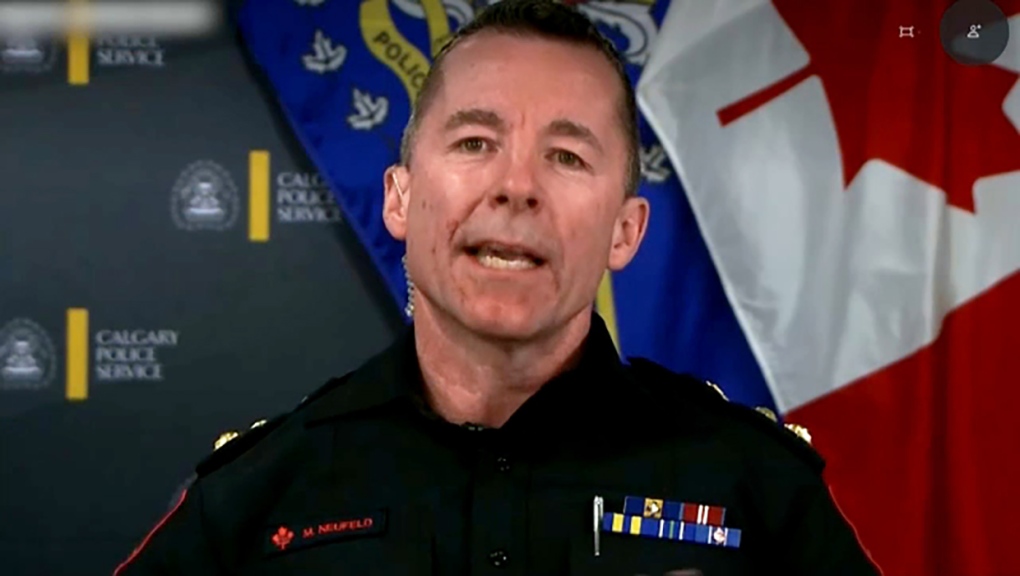'Not ready': Alberta police association says it won't support drug decriminalization
As others in Canada start to take steps towards new personal possession rules, Alberta's police association says it's too soon to decriminalize hard drugs in our province.
Calgary's top cop Mark Neufeld, speaking on behalf of the Alberta Association of Chiefs of Police, says there's not enough evidence that shows the strategy alone will have an impact.
"By itself, decriminalization would not reduced rates of addiction or overdose," he said. "(It) triggers an immediate need for structural and societal changes in areas that do not currently exist."
The association says there is still work in health, social services and justice that needs to be done before rules can be overhauled. It believes premature changes will result in complaints and open public drug use that will lead to more work for officers.
"If you were to just pull sort of one lever, and it was going to be the decriminalization lever, all it would do is just make it easier to possess illicit drugs and also to see individuals using them in public," Neufeld said. "We're not ready."
 Calgary police chief Mark Neufeld says the city isn't ready to decriminalize drugs
Calgary police chief Mark Neufeld says the city isn't ready to decriminalize drugs
OPEN DRUG USE HAPPENING NOW: ADVOCATES
But while the chief is trying to save his officers added duties, many advocates point out that policing work is already embedded in drug use effects -- and decriminalization would be a step to remedying that.
Across the country in 2018 to 2020, almost 28,000 annual arrests were made for possession.
"We're making people's lives very miserable if they use drugs," advocate Euan Thomson told CTV News. "With a new strategy, drug use will likely go down, people will gain stability in their lives and as their human rights are restored, and our communities will actually become safer."
Thomson points to Portugal, where decades-old decriminalization can be directly linked to a decrease in overdose deaths and drug use in teens, and to an increase in those seeking treatment.
"Decriminalization is very much needed, even if it's on its own," Thomson said. "Just like we saw with cannabis legalization, the sky is not going to fall on the day you decriminalize all drugs."
The City of Vancouver has applied for an exemption from the federal controlled substances act so it can update its personal possession rules.
British Columbia applied to the federal government in November to remove criminal penalties for people who possess small amounts of illicit drugs for personal use. The province argued that substance abuse and addiction is a public health issue, not a criminal one.
Since B.C. declared a public health emergency in 2016, 7,700 British Columbians have died because of a toxic drug supply.
Toronto's board of health said it would also seek permission from the federal government to allow drug users to carry small amounts for personal use.
Calgary's police chief expects many more cities will also explore that option.
"We're aware that other provinces have submitted requests to Health Canada seeking an exemption from the Controlled Drugs and Substances Act that would decriminalize personal possession of illicit drugs. These are conversations that are ongoing in our province as well,'' said Neufeld.
"I'm not concerned that this is moving forward in any way that's imminent. It is a discussion that has been ongoing for the last number of years, which has been intensified obviously by the drug poisonings and opioid overdoses."
As of now, no changes are imminent in Alberta.
With files from The Canadian Press .
CTVNews.ca Top Stories

Quebec nurse had to clean up after husband's death in Montreal hospital
On a night she should have been mourning, a nurse from Quebec's Laurentians region says she was forced to clean up her husband after he died at a hospital in Montreal.
Northern Ont. lawyer who abandoned clients in child protection cases disbarred
A North Bay, Ont., lawyer who abandoned 15 clients – many of them child protection cases – has lost his licence to practise law.
Bank of Canada officials split on when to start cutting interest rates
Members of the Bank of Canada's governing council were split on how long the central bank should wait before it starts cutting interest rates when they met earlier this month.
Maple Leafs fall to Bruins in Game 3, trail series 2-1
Brad Marchand scored twice, including the winner in the third period, and added an assist as the Boston Bruins downed the Toronto Maple Leafs 4-2 to take a 2-1 lead in their first-round playoff series Wednesday
Cuban government apologizes to Montreal-area family after delivering wrong body
Cuba's foreign affairs minister has apologized to a Montreal-area family after they were sent the wrong body following the death of a loved one.
'It was instant karma': Viral video captures failed theft attempt in Nanaimo, B.C.
Mounties in Nanaimo, B.C., say two late-night revellers are lucky their allegedly drunken antics weren't reported to police after security cameras captured the men trying to steal a heavy sign from a downtown business.
What is changing about Canada's capital gains tax and how does it impact me?
The federal government's proposed change to capital gains taxation is expected to increase taxes on investments and mainly affect wealthy Canadians and businesses. Here's what you need to know about the move.
'Life was not fair to him': Daughter of N.B. man exonerated of murder remembers him as a kind soul
The daughter of a New Brunswick man recently exonerated from murder, is remembering her father as somebody who, despite a wrongful conviction, never became bitter or angry.
'Anything to win': Trudeau says as Poilievre defends meeting protesters
Prime Minister Justin Trudeau is accusing Conservative Leader Pierre Poilievre of welcoming 'the support of conspiracy theorists and extremists,' after the Conservative leader was photographed meeting with protesters, which his office has defended.






























